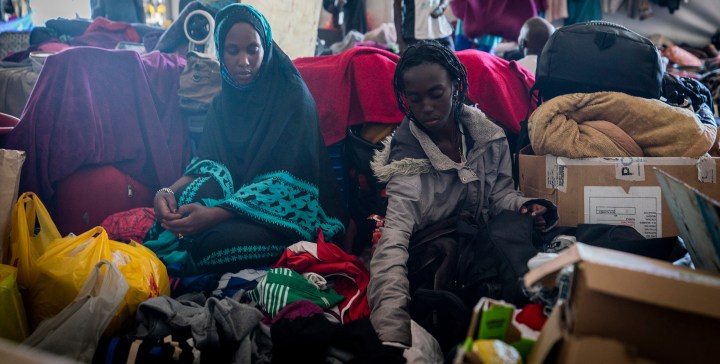South Africa
Cape Town ‘refugee camps’ to close down at end of April

Two temporary shelters located at Paint City in Bellville and Wingfield Military Base in Kensington will close at the end of April when amenities are removed from the sites. The refugees housed there have the option to voluntarily repatriate to their countries of origin or reintegrate with local communities.
Addressing a press briefing on Monday, Home Affairs Minister Aaron Motsoaledi announced the government’s final efforts to resolve the Cape Town refugee crisis which has continued for nearly two years.
He said two temporary shelters, in Paint City, Bellville and the Wingfield Military Base in Kensington, would close down by the end of April.
Protesting refugees and asylum seekers have been housed there under the Disaster Management Regulations for nearly a year.
The group, which has been protesting since October 2019, demanded resettlement to Canada, citing fears of xenophobic violence in South Africa and problems acquiring documents from Home Affairs.
Group resettlement, however, has been repeatedly denied by the United Nations High Commissioner for Refugees (UNHCR) as it contravenes international protocols, but two options were put on the table: the first, reintegration into local communities and the second, voluntary repatriation to their countries of origin.
Motsoaledi said the repatriation and reintegration process would take place for two weeks from 15 April. Once the two weeks are over, government agencies providing services and amenities at both shelters will vacate the area.
“Meaning, the tents will be removed, the ablution facilities and showers will be no more and whoever is left on the streets will be dealt with by the law enforcement agencies under the applicable legislation.”
In November 2020 Daily Maverick reported that ablution facilities had already been removed from the shelter at Paint City.
There had been squabbles between the Department of Public Works and Infrastructure (DPWI), the Department of Home Affairs and the City of Cape Town over who was responsible for the wellbeing of the displaced migrants.
Motsoaledi explained that the UNHCR had offered the protesters a “generous proposition”:
“If they take the option of resettling in communities where they came from, the United Nations will pay for them three months’ rental wherever they find accommodation. In addition, the United Nations will supply them, wherever they have settled, with food for a period of three months while they are finding their feet.”
The International Organisation for Migration (IOM) further offered to buy plane tickets for those who wished to return to their countries of origin.
So far, 121 protesters have agreed to be repatriated while 390 people have accepted the reintegration option and left the camps.
“The International Organisation for Migration is preparing to fly them out of the country to DRC, Burundi and Côte d’Ivoire, but an extraordinary majority are from DRC.”
The protesters had settled in and around Greenmarket Square after they were forcibly moved from outside the UNHCR offices in Waldorf Square in October 2019 where they were conducting a sit-in protest.
The group split into two factions: one supporting refugee leader Jean-Pierre Balous, the other supporting rival leader Papy Sukami, whose group was banished from the church and forced to sleep outdoors.
After flouting by-laws, Sukami’s group was removed from Greenmarket Square after a court order was granted by the Western Cape High Court in favour of the City of Cape Town. When the State of Disaster was declared in March, both groups were later moved to the two shelters as a precautionary measure against the spread of Covid-19.
Motsoaledi said 41 of the protesters were taken to Lindela Repatriation Centre for deportation after their applications had been rejected and they failed the appeals process.
Sukami, and Balous’ wife, Aline Bukuru, were among those deported. Balous, who is in prison on criminal charges, has exhausted the appeals process and is liable for deportation.
Motsoaledi said the refugee leaders had persuaded protesters to leave their homes and some of their livelihoods based on an “ill-conceived scam of the promise of resettlement to another country”. DM



















 Become an Insider
Become an Insider
Comments - Please login in order to comment.